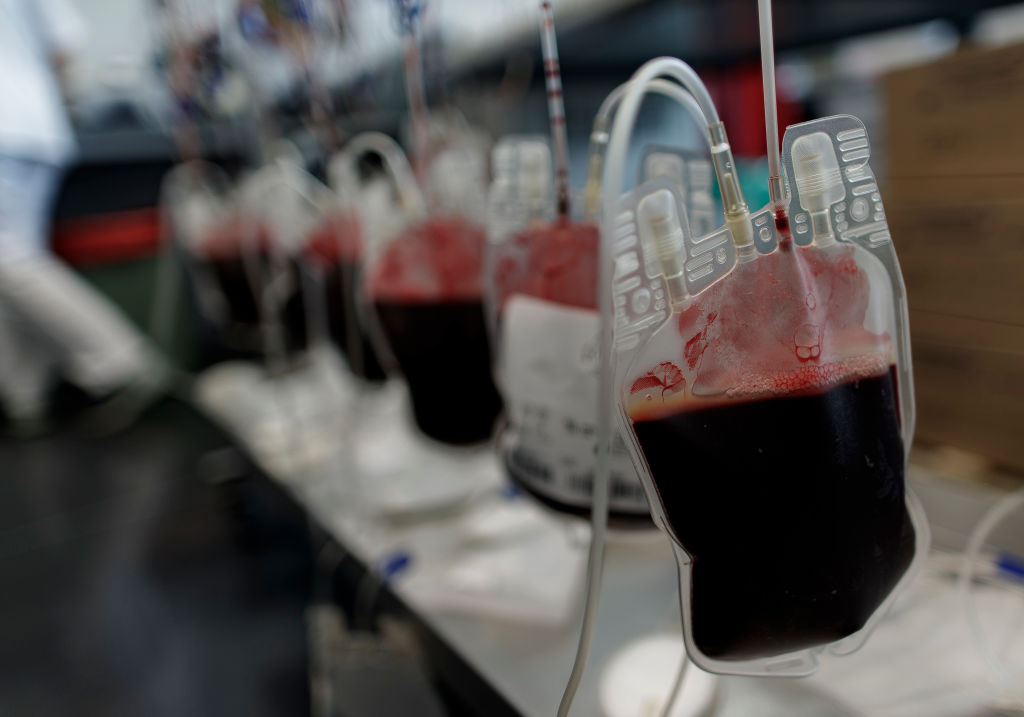More gay and bi men allowed to donate blood as rules finally changed – but activists say it doesn’t go far enough

The NHS will ask all donors about recent seuxal behaviours, meaning more LGBT+ people will be eligible to donate blood, plasma and platelet. (Envato Elements)
The British government on Monday (14 June) eased blood donation rules for gay, bisexual and queer men – yet activists warn harmful restrictions remain.
Blood donation rules in England, Scotland and Wales have long screened out donors if they are a man who has had oral or anal sex with another man.
This is because male donors were asked to disclose whether they have had sex with another man during checks.
But coming into effect on World Blood Donor Day and following recommendations from a health committee, British blood services will now assess donor eligibility on a person-by-person basis instead of applying a blanket restriction.
So, rather than just men, all people regardless of gender and sexuality will be asked the same questions on recent sexual activity, if any.
This means anyone who has had the same sexual partner for the last three months will be eligible, allowing more LGBT+ folk than ever before to donate blood, platelets and plasma.
Those who have a new sexual partner and have not had anal sex, have not recently been exposed to a sexually transmitted infection or used pre-exposure prophylaxis (PrEP) or post-exposure prophylaxis (PEP) will also be eligible.
Today marks a landmark change to blood donation eligibility rules! 🎉🙌
These new eligibility rules will allow more men who have sex with men to donate blood, platelets and plasma.
Read more➡️ https://t.co/MsTzKHc5AY#WorldBloodDonorDay pic.twitter.com/bOW0aNudxd
— NHS Blood+Transplant (@NHSBT) June 14, 2021
It’s a long-sought for shift in policy quickly hailed as “historic” by top LGBT+ advocates, but sexual health groups warned that the blood donation process is still riddled by “barriers”.
“Patient safety is at the heart of everything we do,” said the blood service’s chief nurse for blood donation Ella Poppitt.
“This change is about switching around how we assess the risk of exposure to a sexual infection, so it is more tailored to the individual.
“We screen all donations for evidence of significant infections, which goes hand-in-hand with donor selection to maintain the safety of blood sent to hospitals.”
In tweaking the donor safety check form, NHS Blood and Transplant said eligibility will be based more on the individual circumstances surrounding health, travel and sexual activities deemed high-risk.
Those who have had anal sex with a new partner or multiple partners in the last three months will not be able to give blood. But Poppit stressed that they may be eligible in the future.

(Eduardo Parra/Europa Press via Getty Images)
“All donors will now be asked about sexual behaviours which might have increased their risk of infection, particularly recently acquired infections,” she said.
“This means some donors might not be eligible on the day but may be in the future.”
The move follows recommendations of the FAIR (For the Assessment of Individualised Risk) Report, which included insight from Stonewall and HIV and sexual health charity Terrence Higgins Trust.
As blood rules are relaxed, ‘barriers’ remain, advocates say
LGBT+ advocacy groups and charities praised the new policy, the latest in the government’s gradual relaxation of blood donation regulations.
“We welcome today’s historic change, which will help ensure more gay and bi men can donate blood and represents an important step towards a donation selection policy entirely based on an individualised assessment of risk,” Robbie de Santos, director of communications and external affairs for Stonewall, said.
But the Terrence Higgins Trust took aim at the government for what it called a “discriminatory restriction” in England that will continue to dent Black communities’ ability to give blood.
The restriction, the charity said, relates to a three-month deferral period for anyone who has a “partner who has, or you think may have been, sexually active in parts of the world where HIV/Aids is very common” and references “most countries in Africa”.
This “vague” question, it said, “acts as a significant barrier for many who wish to donate and at the expense of the blood service’s urgent push to get more Black people to give blood”.
Just one per cent of current blood donors in Britain are Black, according to data from NHS Blood and Transplant.
“It’s great news that far more gay and bisexual men can safely donate blood,” said the trust’s chief executive, Ian Green.
“But the excitement of that announcement is significantly dampened by another discriminatory question being retained by government in the blood donation process in England, which presents a significant barrier to Black donors, in particular, giving blood.”
This was amplified by the National AIDS Trust, which added in a statement that rule “perpetuates misleading stereotypes around HIV”.
“As we mark World Blood Donor Day, we call on the government to reconsider its decision and allow more people to donate much-needed blood,” said the advocacy group’s chief executive Deborah Gold.
“If it is unwilling to do so, it should provide clear reasons why it has decided not to, against current scientific advice.

